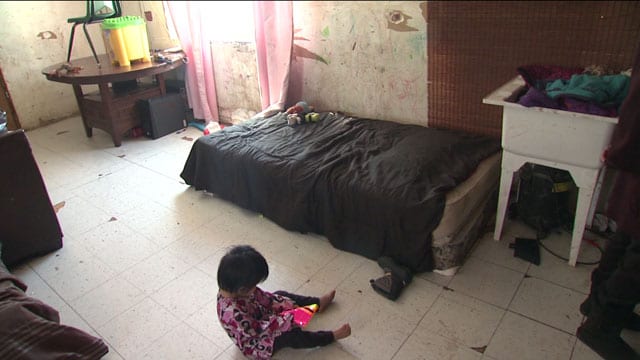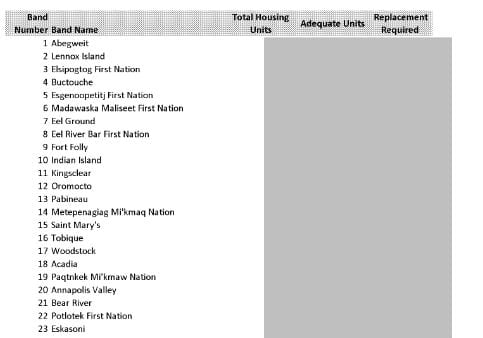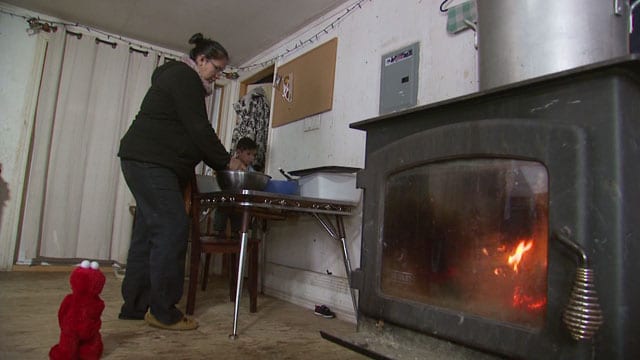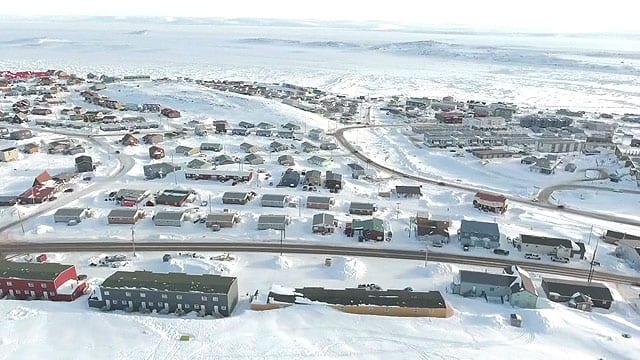APTN National News
The status of housing on First Nations across Canada is just a few years away from reaching epidemic levels says the Assembly of First Nations.
“We’re on the brink of (an) epidemic,” said Kevin Hart, a regional chief with the AFN in Manitoba. “(If) there isn’t any real investments done immediately it will reach epidemic proportion in the next few years.”
Hart held the AFN’s housing portfolio for years and estimates 175,000 houses are needed to immediately address shortages across the country.
The federal government pegs the number much lower at about 21,000.
“You can see we’re being set up for failure right off the bat,” said Hart in an interview with APTN Investigates reporter Melissa Ridgen that is airs Friday at 6:30 p.m. in her story: Housing Crisis Deconstructed.
In Justin Trudeau’s first budget as prime minister he earmarked more than $8 billion in funding for Indigenous people. Many called it “historic” including AFN national chief Perry Bellegarde.

Just over $500 million of the 2016 budget was to go towards housing on First Nations.
It may sound like a lot of money, but a closer look at the numbers show it doesn’t appear to buy many new homes.
The money was spread out over two years and in 2016 the federal government was expected to build 300 homes with that money.
“Buy lottery tickets,” said Charlie Angus, NDP MP for Timmins-James Bay. “You have a better chance of getting a house.”
The money was also supposed to go towards servicing 340 lots, such as sewer hook ups, and renovate 1,400 homes according to statistics provided to Angus’ office last year. The government hopes to build, service and renovate the same amount in 2017.
“I think Canadians are getting their eyes opened but what they probably find really hard to believe is that the government doesn’t make it a priority,” said Angus.
Going by the government’s number of 21,000 new homes means Ottawa is addressing about three per cent of what it says is needed with the 2016 funding.
If you go by the AFN’s the funding barely registers.
APTN National News asked the Indigenous Affairs for basic statistics on housing, such as confirming the number of homes actually built in 2016, but has not received a response.
Angus has tried to get deeper into the housing crisis by asking the Trudeau government for statistics on the number of houses built on every reserve over the last few years.
The government wouldn’t provide them.
An access to information request in 2016 came back almost completely redacted.
“Canadian’s have to ask themselves what exactly department of Indian Affairs is doing when a simple request about the state of housing and housing plans is considered a state secret,” he said.
“When they black out information about housing, or what they’re spending in schools. That tells me they’re lying to the Canadian people and that’s unacceptable. Canadians have a right to know.”

The housing situation on First Nations has been given special attention by APTN National News this week in the series: A Roof Overhead.
Stories have highlighted what families face in different parts of the country.
Overcrowding is the way of life for Garden Hill First Nation in Manitoba.
“My grandkids all sleep on the floor here as you can see,” said Sharon Beardy. “One mother with two little ones and my four grandkids just sleep anywhere. Anywhere possible on the floor.”
The 3,500 residents share 500 homes.
Three or four families can share one residence at a time.
In Kitcisakik, an Anicinape First Nation five hours north of Montréal, it’s known for its third world living conditions.
The community of 400 live without electricity, running or a sewage system.
“A shower and toilet is what’s missing. That’s what the people in our community are always talking about it. They tell me they would like all those basic needs for their children,” Charlie Papatie told APTN reporter Danielle Rochette.
The Quebec government has provided small amounts of money to renovate homes over the last several years and last year said it would provide an additional $2 million to help renovate more.

Nunavut has faced a housing crisis since the territory was established in 1999.
APTN reporter Kent Driscoll found that despite evidence that there is a housing in Iqaluit there is little being done about it.
Fifty per cent of all homes in Nunavut are social housing – homes with subsidized rent for people who can’t afford it. Of those social units, 63 per cent are in need of major repairs.
The wait list to get into those beat up homes is long. One in five of all Nunavut residents are on a waiting list for social housing.
When you ask Iqaluit’s Joamie Lyta to explain just how many people live in her small apartment, she needs to stop and count on her fingers.
“Let me count, there’s me, him, my son, my granddaughter, my grandson, my other granddaughter, my nephew, my other son. There’s nine of us,” explained the social housing resident in Iqaluit.
Nine in the day time. At night she often adds two more to her over crowded home.
“My other two brothers, they come to, to sleep at my house, they got no place to stay,” she said. “So sometimes there’s 11 or 12 in my house.”
It sounds extreme, but for Nunavut, this isn’t the exception, it is the rule.

The federal government just announced in the 2017 budget it would fund $240 million over the next 11 years for housing in Nunavut but has been told the amount needed easily exceeds $2 billion.
The Government of Nunavut is scheduled to build 202 housing units over the next two years, in 16 of Nunavut’s communities. Just to get caught up to the current wait list, you would have to build 3,580 homes for 10,500 people.
Nunavut’s Housing Minister George Kuksuk turned down APTN’s request for an interview for this story. His staff said the minister was too busy.
APTN reporter Charlotte Morritt-Jacobs reports on the lack of affordable housing in the Northwest Territories on the 6 p.m. national news.
Like many places across Canada, there are a lot of families in need of support but little housing. On top of that people in territory face some of the highest costs of living in the country.











there is no need for thiss .. its been going on for years in canada and states ..its a disgrace . take care of them first before careing for others u alow in country just like states need to.. there people to not animals .